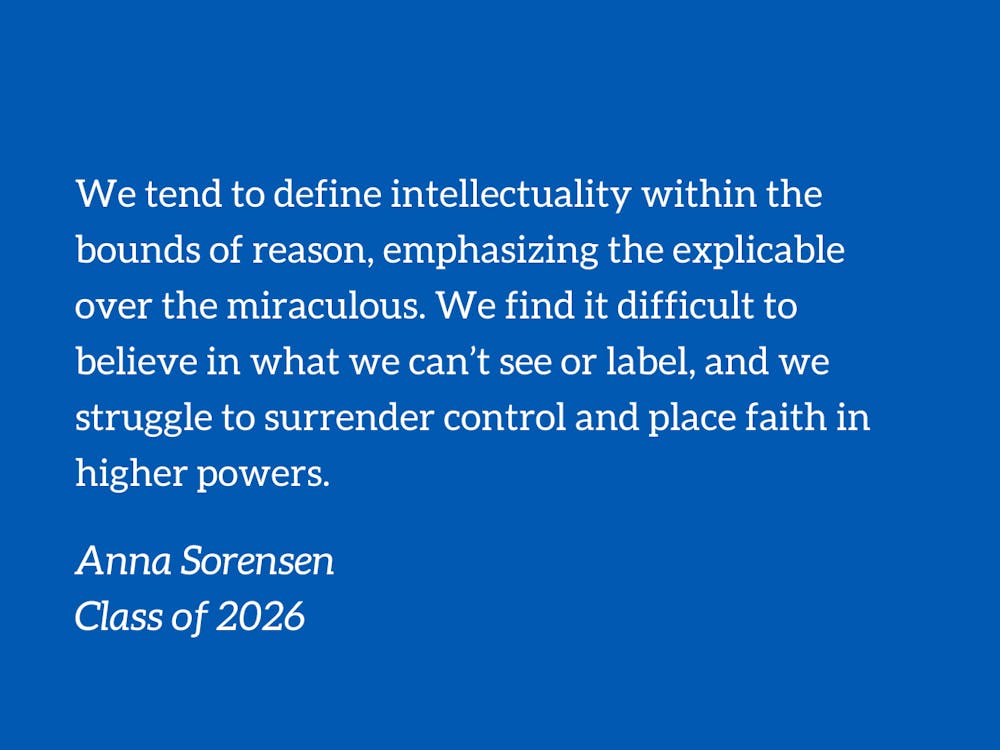Easter is hands down my favorite day of the year. Growing up, Easter meant waking up at 7 a.m. for an egg hunt before heading to church for back-to-back services where my siblings and I got to sing the most glorious pieces of choir music, accompanied by a brass timpani and an organ which literally pulled out all the stops. Easter is — at its core — a celebration of joy and grace, and a powerful reminder that we are loved. So, being away from home for Easter as a first-year last year was difficult. It was the first time I hadn’t celebrated with my family and home congregation in over 10 years, and I felt lonely and disconnected.
But a year has passed since then, and Easter has rolled around once again. I’ve spent this past year growing more attached to the Chapel, and I have slowly made it my own place of worship. From hours of choir rehearsal to random moments of prayer, the Chapel has been a constant in my day-to-day college life. This Easter, as the resurrection hymns I know by heart rose within the Chapel walls, I felt as though I was truly part of the congregation.
The Chapel carries different meanings for different people at Duke. For some, it’s a central, enduring trademark of our university. Indeed, few buildings on campus are as recognizable and striking as this magnificent piece of architecture. It’s also a beautiful photo-op, especially this time of year as the life surrounding it blooms in full force. But for many others — myself included — the Chapel is a home for faith and spirituality. The Chapel is a physical reminder of the comforting and persisting presence of God and of a community grounded in hope and love amidst a busy college life.
Being a religious student in college comes with its difficulties. For those who come from particularly expressive religious backgrounds, it can be challenging to find time to worship at school. Between navigating living on our own, taking college-level classes, and trying to make friends along the way, there’s enough on our plates to manage. If you practice your faith more privately, you may struggle to feel connected to God and a religious community when you find yourself in an entirely new environment, separated from the ties to faith you find at home.
There’s also the challenge of navigating your religious identity in college. In an elite academic setting like Duke, there can be biases against spirituality and religious belief. We tend to define intellectuality within the bounds of reason, emphasizing the explicable over the miraculous. We find it difficult to believe in what we can’t see or label, and we struggle to surrender control and place faith in higher powers.
More concretely, sentiment against organized religion is certainly present on college campuses. I will be the first to admit that there is valid reason to be frustrated with organized religion today. In a political landscape where religion is often wielded as a weapon of division by a select few in power, it’s easy to lose sight of how much good religious belief brings to the world. The Duke Chapel’s mission of "bridging faith and learning" seems especially apt to address these issues, which is an initiative I am particularly grateful for.
Despite the challenges of living by faith in college, studies show that college students crave spirituality and spaces to explore their beliefs. During the complicated transition to young adulthood, religion can be a source of comfort and foster mental well-being. I, for one, leaned heavily into my faith during the first few months here at Duke. Duke Evensong Choir was the very first activity I picked up, and it remains the most valuable use of my extracurricular time to this day. Every time I enter the Chapel, I feel like some part of me is coming home, and I know I belong to something much greater than myself and my struggles or stresses.
The Duke Chapel is doing some amazing work to create spaces where students can explore their spiritual identities. Anyone can learn about these resources by dropping in for a visit or by perusing the Chapel’s website. Check out the podcast Sounds of Faith to learn more about how Rabbi Elana Friedman, Rev. Kathryn Lester-Bacon and Brother Joshua Salaam support students on their spiritual journeys through college life. Get involved with volunteer work in Durham, which aims to "build and deepen relationships in the community [and work at] the intersections of faith and justice to bridge the differences that divide humanity."
Above all, I would urge all Duke students to keep an open mind as you encounter people from diverse walks of life and faith and to challenge yourself to appreciate the power of inexplicable forces. Every college student should educate themselves on what it actually means to practice religion in today’s world — with all its nuances and dimensions. It is too powerful an influence to be neglected or dismissed by intelligent students preparing to engage empathetically with the people around them.
An accessible and robust home of worship was not something I consciously factored into my college decision when I was applying to Duke. But the rewards I’ve found in both the recluse and the community at the Chapel affirm that I should have considered it. So, I genuinely thank God every day that I ended up here because of all the blessings I’ve found in friends, professors, and this beautiful campus, and because of all the ways my faith continues to mature at Duke.
Anna Sorensen is a Trinity sophomore. Her column typically runs on alternate Tuesdays.
Get The Chronicle straight to your inbox
Sign up for our weekly newsletter. Cancel at any time.

